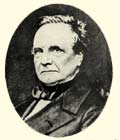
Babbage, Charles (1791-1871)
This English scientist and mathematician, inventor of programmable calculators, was born on 26 December 1791 in Totnes, Devonshire.
In 1810, he was admitted to Trinity College, Cambridge, where he graduated in mathematics in 1814.
In 1815, he and J. Herschel founded the Analytical Society, for the purpose of reforming mathematics teaching in England.
On 14 March 1816, he was elected member of the Royal Society.
In 1828, he joined Cambridge University as a mathematics professor. Although he was distinguished in the field of function theory and algebraic analysis, he put heart and soul into a an attempt to build a machine capable of building accurate mathematical tables.
In 1833, he completed his Difference Engine capable of calculating and printing logarithms of 1 to 108,000, and he laid the theoretical groundwork for any calculating automaton.
Over the following years, with funding from the British government and partnered by Ada Lovelace, he focused on the project of building the Analytical Engine, which was to be able to complete any sequence of arithmetic instructions. Although he did not achieve his aim, he did establish the basic principles of modern computers, such as the program concept, the use of memory to store results and the arithmetic unit. This machine, built exclusively from mechanical parts and many gear wheels, used punch cards for data and program input and printed on paper.
At the side of Ada Lovelace, he spent his last years and resources on building a machine that would infallibly predict horse race winners.
BBabbage died on 18 October 1871 in London.
